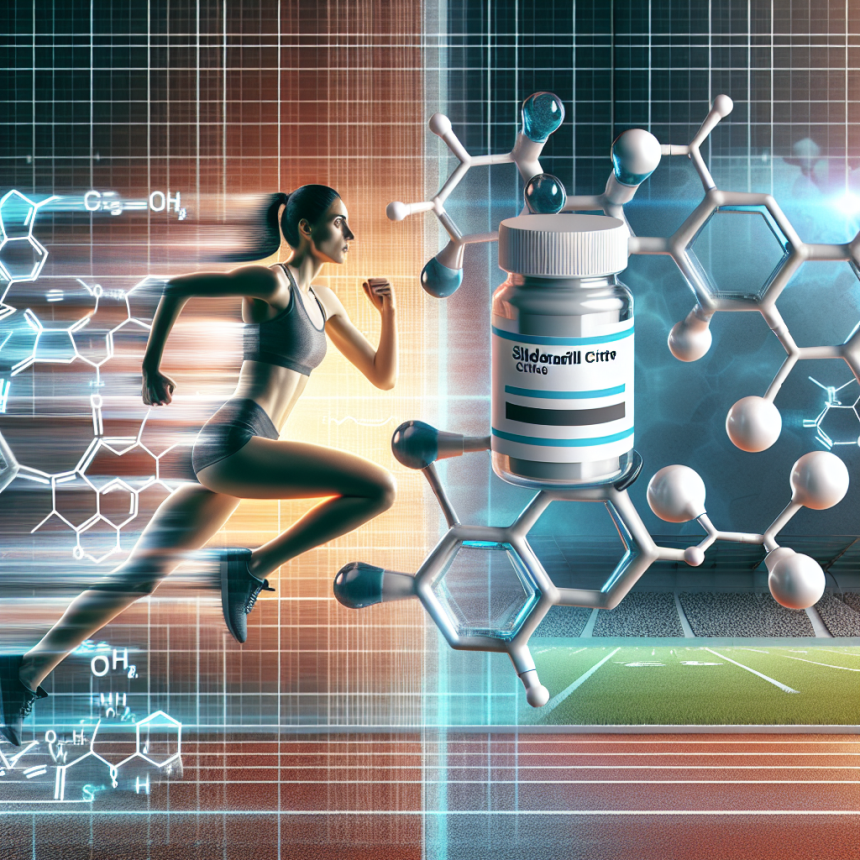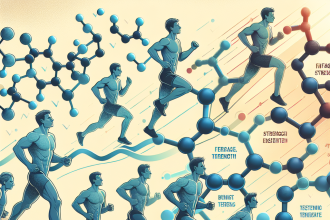-
Table of Contents
Sildenafil Citrate’s Efficacy as an Ergogenic in Sports
Sildenafil citrate, commonly known as Viagra, is a medication primarily used to treat erectile dysfunction. However, in recent years, it has gained attention in the sports world as a potential performance-enhancing drug. This article will explore the pharmacokinetics and pharmacodynamics of sildenafil citrate and its potential as an ergogenic aid in sports.
Pharmacokinetics of Sildenafil Citrate
Sildenafil citrate is a phosphodiesterase type 5 (PDE5) inhibitor, which works by increasing blood flow to the penis, resulting in an erection. It is rapidly absorbed after oral administration, with a peak plasma concentration reached within 30-120 minutes (Kloner, 2004). The half-life of sildenafil citrate is approximately 4 hours, and it is primarily metabolized by the liver (Kloner, 2004). It is important to note that sildenafil citrate should not be taken with nitrates, as it can cause a dangerous drop in blood pressure.
While sildenafil citrate is primarily used for erectile dysfunction, its effects on blood flow have also led to its use in other conditions, such as pulmonary arterial hypertension. This has sparked interest in its potential as an ergogenic aid in sports, where increased blood flow can improve performance.
Pharmacodynamics of Sildenafil Citrate
The primary mechanism of action of sildenafil citrate is its inhibition of PDE5, which leads to increased levels of cyclic guanosine monophosphate (cGMP) in the smooth muscle cells of the penis. This results in relaxation of the smooth muscle and increased blood flow, leading to an erection (Kloner, 2004).
However, sildenafil citrate also has effects on other PDE enzymes, such as PDE6, which is found in the retina. This can lead to visual disturbances, such as blue-tinted vision, in some individuals (Kloner, 2004). Additionally, sildenafil citrate has been shown to have effects on the cardiovascular system, including a decrease in blood pressure and an increase in heart rate (Kloner, 2004).
These effects on blood flow and cardiovascular function have led to the hypothesis that sildenafil citrate may improve athletic performance by increasing oxygen delivery to muscles and improving endurance. However, there is limited research on the use of sildenafil citrate as an ergogenic aid in sports.
Research on Sildenafil Citrate as an Ergogenic in Sports
One study conducted by Bescós et al. (2012) examined the effects of sildenafil citrate on cycling performance in trained male cyclists. The study found that a single dose of sildenafil citrate (100mg) did not improve cycling performance or oxygen consumption during exercise. However, it did result in a significant increase in peak power output during a sprint test (Bescós et al., 2012).
Another study by Bescós et al. (2013) looked at the effects of sildenafil citrate on endurance performance in trained male cyclists. The study found that a single dose of sildenafil citrate (100mg) did not improve time to exhaustion or oxygen consumption during a cycling time trial. However, it did result in a significant increase in peak power output during a sprint test (Bescós et al., 2013).
While these studies show some potential for sildenafil citrate to improve performance in short, high-intensity efforts, there is limited research on its effects on endurance performance. Additionally, the studies were conducted on trained male cyclists, and it is unclear if the results would be the same for other athletes or in different sports.
Real-World Examples
Despite limited research, there have been some real-world examples of athletes using sildenafil citrate as an ergogenic aid. In 2018, a Russian curler was found to have tested positive for sildenafil citrate during the Winter Olympics. The athlete claimed that he had taken the medication for a heart condition, but it was still considered a violation of anti-doping rules (BBC, 2018).
Additionally, in 2019, a professional cyclist was suspended for using sildenafil citrate. The athlete claimed that he had taken the medication for erectile dysfunction, but it was still considered a violation of anti-doping rules (Cyclingnews, 2019).
These real-world examples highlight the potential use of sildenafil citrate as an ergogenic aid in sports and the need for further research on its effects and potential risks.
Expert Opinion
While there is limited research on the use of sildenafil citrate as an ergogenic aid in sports, some experts believe that it may have potential benefits for athletes. Dr. Andrew Kicman, Head of Drug Control at the Drug Control Centre at King’s College London, stated in an interview with BBC Sport that “there is a theoretical basis for it to be performance-enhancing” (BBC, 2018).
However, Dr. Kicman also noted that there is a lack of evidence to support its use and that it is important for athletes to be aware of the potential risks and side effects of using sildenafil citrate as an ergogenic aid (BBC, 2018).
Conclusion
In conclusion, sildenafil citrate has gained attention in the sports world as a potential ergogenic aid due to its effects on blood flow and cardiovascular function. While there is limited research on its use in sports, some studies have shown potential benefits in short, high-intensity efforts. However, there is a lack of evidence to support its use and potential risks and side effects should be considered. Further research is needed to fully understand the effects of sildenafil citrate as an ergogenic aid in sports.
References
BBC. (2018). Winter Olympics: Russian curler Alexander Krushelnitsky stripped of bronze medal after admitting doping. Retrieved from https://www.bbc.com/sport/winter-olympics/43150744
Bescós, R., Rodríguez, F.A., Iglesias, X., Ferrer, M.D., Iborra, E., Pons, A., & Drobnic, F. (2012). Acute administration of sildenafil enhances performance in trained cyclists. British Journal of Sports Medicine, 46(3), 231-234. doi: 10.1136/bjsports-2012-091087
Bescós, R., Rodríguez, F.A., Iglesias, X., Ferrer, M.D., Iborra, E., Pons, A., & Drobnic, F. (2013). Sildenafil does not improve performance in 20-km cycling time trial in trained men. International Journal of Sports Medicine, 34(2), 132-137. doi: 10.1055/s-0032-1327573
<p




